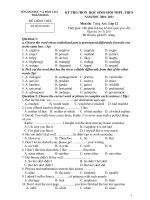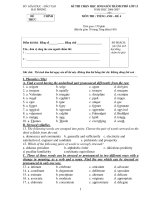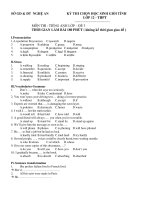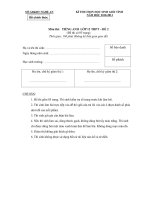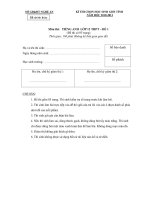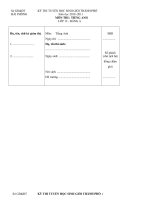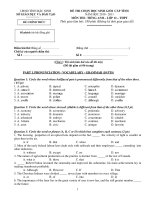KỲ THI CHỌN HỌC SINH GIỎI TỈNH NĂM HỌC 2010-2011 MÔN THI: TIẾNG ANH LỚP 12 (ĐỀ LUYỆN SỐ 1 pptx
Bạn đang xem bản rút gọn của tài liệu. Xem và tải ngay bản đầy đủ của tài liệu tại đây (160.49 KB, 8 trang )
1
SỞ GD & ĐT NGHỆ AN Kè THI CHỌN HỌC SINH GIỎI TỈNH
@ NĂM HỌC 2010-2011
MễN THI: TIẾNG ANH LỚP 12 (ĐỀ LUYỆN SỐ 1)
Thời gian : 150 phỳt (khụng kể thời gian giao đề)
SECTION A – PHONETICS
I. Choose the word whose underlined part is pronounced differently from that of the others.
1. A. wood B. food C. look D. foot
2. A. scholarship B. chaos C. cherish D. chorus
3. A. absent B. recent C. decent D. present
4. A. lose B. chose C. close D. dose
5. A. naked B. wicked C. beloved D. confused
1. 2. 3. 4. 5.
II. Identify the word whose stressed pattern is different from that of the others.
1. A. experiment B. giant C. windmill D. software
2. A. commodity B. material C. deposit D. quality
3. A. activity B. physical C. increase D. expectancy
4. A. address B. believe C. millionaire D. mislead
5. A. identify B. considerable C. inhabitant D. surface
1. 2. 3. 4. 5.
SECTION B – VOCABULARY AND GRAMMAR
I. Choose the best answer from A, B, C or D.
1. I am not convinced that financial advisers always act in their clients’ best .
A. advantage B. interest C. intention D. result
2. Many children who get into trouble in their early teens go on to become offenders.
A. persistent B. insistent C. consistent D. resistant
3. Race relations in this country are unlikely to improve until people overcome their
feelings of hostility towards foreigners.
A. interior B. internal C. inverted D. innate
4. The real test of your relationship will come when you start to see your new boyfriend
and all.
A. faults B. spots C. moles D. warts
5. It’s a shame they didn’t pick you, but it doesn’t out the possibility that you might
get a job in a different department.
A. rule B. strike C. cancel D. draw
6. The case against the bank robbers was for lack of evidence.
A. discarded B. dismissed C. refused D. eliminated
7. Please from smoking until the plane is airborne.
A. refrain B. exclude C. resist D. restrain
8. We’re planning a holiday in Hong Kong when Peter retires but I don’t know whether it’ll
really ever come .
A. on B. out C. off D. round
9. No matter how angry he was, he would never to violence.
A. resolve B. recourse C. exert D. resort
10. The best soil was away by a torrential rainstorm.
A. gushed B. flowed C. flooded D. washed
11. Five readers the correct solution to our recent competition.
2
A. communicated B. qualified C. submitted D. subscribed
12. Her business must be going rather well, by the car she drives.
A. deducing B. deciding C. inferring D. judging
13. My cousin obviously didn’t much of an impression on you if you
can’t rememeber meeting him.
A. create B. do C. make D. build
14. I was kept awake for most of the night by the of a mosquito in my ear.
A. whine B. moan C. groan D. screech
15. If you would like to wait for a moment, sir, I will just your file on the computer screen.
A. call up B. pull down C. bring in D. pick up
16. He looks very aggressive and threatening, so his soft, gentle voice is rather …………….
A. disembodied B. disconcerting C. dismissive D. discordant
17. If I were you, I would regard their offer with considerable , because it seems too
good to be true.
A. suspicion B. doubt C. reservation D. disbelief
18. My sister’s confidence in her ability to play the piano was badly by her last music teacher.
A. subsided B. weakened C. undermined D. loosened
19. Fearing for his life, he the mugger for mercy.
A. pleaded B. petitioned C. urged D. begged
20. I am sorry to have bothered you – I was under the that you wanted me to call you.
A. mistake B. miscalculation C. Misconception D. misapprehension
1. 2. 3. 4. 5.
6. 7. 8. 9. 10.
11. 12. 13. 14. 15.
16. 17. 18. 19. 20.
II. The following paragragh has 10 mistakes. Identify the mistakes in the lines and correct
them. Write your answer in the space provided.
Who were the people responsible for collection and sending plants from one country to another?
And why did they do it? Initially they were travellers with another purposes: traders, colonists,
pilgrims and missionaries have all been important in providing new plants for English gardens.
They sent back indigenous wild plants, or sometimes, as in the cases of visitors to China and
Japan, plants which have been cultivated and improved for hundreds of years. This worked, of
course, in both directions: English gardens were making in the most unlikely places. Travellers
did not always recognise an interesting plant on seen it – interesting, that is, to the collector at
home. So in the 16th and 17th century, attempts were made to collect on a most professional
basis, either by patrons sending collections into the field, or by subscriptions to finance local
enthusiasts in the most promised areas. By 1611 John Tradescant was travelling and collecting in
France and other parts of Europe. Lately, Peter Collinson, a London merchant, who had seen the
richness of the plant material sending back by Tradescant, organised a syndicate to finance the
amateur botanist John Bartram. Before long, special collectors were being dispatched to all parts
of the world by institutions such as the Chelsea Physic Garden.
Mistake Correction Mistake Correction
1. 6.
2. 7.
3. 8.
4. 9.
5. 10.
III. Use the correct form of each of the words given in parentheses to fill in the blank in each
sentence.
3
1. Please (know) our letter of the 14
th
. We have not had a reply.
2. Keith’s exam results turned out to be (disaster).
3. There will be no pay rises in the (see) future.
4. Jim is one of the most (speak) members of the committee.
5. What are the entry (require) at this university?
6. Jackie suffered as a child from a very strict (bring).
7. I think that your (assume) about the cost are wrong.
8. This statue (memory) the soldiers who died in the war.
9. The idea that the sun ‘rises’ is a popular (conceive).
10. Ruth has gone back to college to get a teaching (qualify).
1. 2. 3. 4. 5.
6. 7. 8. 9. 10.
SECTION C – READING
I. Read the following passage, and then choose the best answer from A, B, C,D.
San Francisco is where I grew up between the ages of two and ten and where I lived for a
period when I was about 13 and again as a married man from the ages of 37 to 51. So quite a big
slice of my life has been spent there. My mother, who is now 90, still lives in Los Gatos, about 60
miles south of San Francisco. Even though I have since lived in Switzerland and settled in
London over 25 years ago, I have kept property in California for sentimental reasons.
I was born in New York and I love the United States. It is still a land of enormous drive,
strength, imagination and opportunity. I know it well, having played in every town and, during
the war, in every army camp. I have grown new roots in London as I did in Switzerland and if I
am asked now where I want to live permanently, I would say London. But I will always remain
an American citizen.
Climatically, San Francisco and London are similar and so are the people who settle in both
cities. San Francisco is sophisticated, and like London, has many parks and squares. Every day
my sisters and i were taken to play in the parks as children. We had an English upbringing in
terms of plenty of fresh air and outdoors games. I didn’t go to school. My whole formal education
consisted of some three hours when I was five. I was sent to school but came home at noon on the
first day and said I didn’t enjoy it, hadn’t learned anything and couldn’t see the point of a lot of
children sitting restlessly while a teacher taught from a big book. My parents decided, wisely I
think, that school was not for me and I never went back.
My mother then took over my education and brought up my two sisters and me rather in the
way of an educated English lady. The emphasis was on languages and reading rathar then
sciences and mathematics. Sometimes she taught us herself, but we also had other teachers and
we were kept to a strick routine. About once a week we walked to Golden Gate Park which led
down to the sea and on our walks my mother taught me to read music. One day I noticed a small
windmill in the window of a shop we passed on our way back to the park and I remember now
how my heart yearned for it. I couldn’t roll my ‘r’s when I was small and my mother who was a
perfectionist regarding pronunciation, said if I could pronounce an ‘r’ well I’d have the windmill.
I practised and practised and one morning woke everyone up with my ‘r’s. I got the windmill. I
usually get the things I wantin life-but I work for them and dream of them.
1. When the writer was twelve he was living in
A. San Francisco. B. Los Gatos.
C. London D. a place unknown to the reader.
2. During the war, the writer
A. became an American soldier. B. went camping all over the country.
C. gave concerts for soldiers. D. left the United States.
4
3. The writer did not attend school in Amarica because
A. his mother wanted him to go to school in England.
B. his parents did not think he was suited to formal education.
C. his mother preferred him to play outdoors in the parks.
D. he couldn’t get on with the other children.
4. He was educated at home by
A. his mother and other teachers. B. an educated English lady.
C. his mother and sisters. D. teachers of languages and science.
5. The writer managed to obtain the little windmill he wanted by
A. borrowing the money for it B. learning to read music.
C. succeeding in speaking properly. D. working hard at his lessons.
II. Choose the best answer from A, B, C or D to fill in the gaps in the following passage.
OSCAR’S WINNING PERFORMANCE
Two boats, engines paralysed are drifting helplessly towards rocks in a raging sea. Gale-force
winds are blowing as a distress message is relayed to the (1)…………………. .
The west coast search-and-rescue helicopter takes off from Shannon; its (2) is Clew Bay
in County Mayo.
The terrified crews on Sundancer and Heather Berry are only half-a-mile from disaster when
Hotel Oscar, the Irish Marine Emergency Service helicopter arrives and the winch crew
(3) saving their lives. There’s no (4) for the boats – the conditions are
too bad for that. The threatening rocks will make matchwood of them.
It’s not easy to get the rescue line down on the pitching, rolling decks as the pilot, Captain Al
Lockey hovers directly (5) . By the time the exhausted winchman has (6) the
two crew members of Heather Berry, the helicopter is running (7) on fuel. The pair on
Sundancer will have to be abandoned if (8) esle is to survive. As if that decision isn’t
difficult enough, screaming winds make for a treacherous flight out of the bay.
For Captain Lockey, 25 years a helicopter pilot and veteran of typhoon conditions off oil
rigs in the South China Sea, this was the worst experience in a distinguished (9) . In
fact, a change in wind direction was to (10) .
Sundancer its horrible face, much to the (11) of the rescue crew whose hearts were
breaking as they were forced to turn their backs and (12) for home. Medals, it is said
should be given to those who have to (13) that most painful decision to say ‘no’.
Fortunately, most crews can and (14) say ‘yes’ in all conditions and at all (15)
of night and day.
That was Mission 47, accomplished just over three months after Hotel Oscar’s contract began
in July 1991.
1. A. shore B. land C. beach D. seaside
2. A. direction B. destination C. journey D. arrival
3. A. set off B. set up C. set out D. set about
4. A. luck B. way C. hope D. point
5. A. above B. higher C. ahead D. over
6. A. picked out B. picked up C. taken over D. taken off
7. A. low B. clown C. short D. out
8. A. no one B. everyone C. someone D. all
9. A. job B. role C. profession D. career
10. A. spare B. save C. rescue D. prevent
11. A. satisfaction B. comfort C. relief D. gratitude
12. A. go B. fly C. head D. lend
13. A. give B. do C. say D. make
14. A. should B. do C. may D. need
15. A. periods B. moments C. hours D. minutes
5
1. 2. 3. 4. 5.
6. 7. 8. 9. 10.
11. 12. 13. 14. 15.
III. Fill in each numbered gap with one suitable word.
Men have lived in groups and societies (1)…… …. all times and in all places, as (2)…… as
we know. They do not seem (3)…… …… to survive as human beings (4)……… they live in
(5)…….…… cooperation with one (6)…………… . The most basic of (7)……………. human
groups in the family in (8)……………… various forms. The most important reason for this is
the simple (9)…… … that human beings take many years to (10)… …… .
In (11)……… … they are the most helpless of all earthly creatures. For several years after
(12)…… … , a child has to be (13)… ……… , clothed and protected day and night. In all
societies such duties normally fall (14)………… … a family group of some (15)…………… .
Men (16)…….…. groups for countless (17)…… reasons. For instance, it is (18)……………
by cooperating that they are able to (19)…… … their environment and defend (20)……….… .
1. 2. 3. 4. 5.
6. 7. 8. 9. 10.
11. 12. 13. 14. 15.
16. 17. 18. 19. 20.
SECTION D – WRITING
I. Finish each of the following sentences in such a way that it is as similar as possible in
meaning to the sentence printed before it.
1. They were just as good as we had expected.
They certainly lived
2. Even though I admire his courage, I think he is foolish.
Much
3. The brochure gives hardly any useful information.
Precious
4. If you were in the situation I’m in, you’d feel the same.
If you put
5. As he grew older, he became more and more forgetful.
The
6. Although Christopher was the stronger of the two, his attacker soon overpowered him.
Despite his
7. Regarding payment, most major credit cards are acceptable.
As far as
8. After seeing the film for himself, my father has stopped criticising it.
Since
9. No sooner had the witness begun to speak than the judge interrupted her.
The minute
10. It is impossible to accept your explanation without a thorough investigation.
Your explanation
II. Write a composition (250 words) about the following topic:
People attend college or university for many different reasons ( for examples, new
experiences, career preparation, increased knowledge ). Why do you think people attend
college or university? Use specific reasons and examples to support your answer.
6
7
SỞ GD & ĐT NGHỆ AN Kè THI CHỌN HỌC SINH GIỎI TỈNH
TRƯỜNG THPT DIỄN CHÂU 4 NĂM HỌC 2008-2009
ĐÁP ÁN VÀ HƯỚNG DẪN CHẤM
MễN TIẾNG ANH-KHỐI 12
SECTION A – PHONETICS
I. Choose the word whose underlined part is pronounced differently from that of the others.
( 1 point for 1 correct answer X 5 = 5 points )
1. B 2. C 3. D 4. A 5. D
II. Identify the word whose stressed pattern is different from that of the others.
( 1 point for 1 correct answer X 5 = 5 points )
1. A 2. D 3. B 4. C 5. D
SECTION B – VOCABULARY AND GRAMMAR
I. Choose the best answer from A, B, C or D.
( 1 point for 1 correct answer X 20 = 20 points )
1. B 2. A 3. D 4. D 5. A
6. B 7. A 8. C 9. D 10. D
11. C 12. D 13. C 14. A 15. A
16. B 17. C 18. C 19. D 20. D
II. The following paragragh has 10 mistakes. Identify the mistakes in the lines and correct
them. Write your answer in the space provided.
( 1 point for 1 correct answer X 10 = 10 points )
Mistake Correction Mistake Correction
1. collection collecting 6. most more
2. cases case 7. collections collectors
3. have had 8. promised promising
4. making made 9. Lately Later
5. seen seeing 10. sending sent
III. Use the correct form of each of the words given in parentheses to fill in the blank in each
sentence. ( 1 point for 1 correct answer X 10 = 10 points )
1. acknowledge 2. disastrous 3. foreseeable 4. outspoken 5. requirements
6. upbringing 7. assumptions 8. commemorates 9. misconception 10. qualification
8
SECTION C – READING
I. Read the following passage, and then choose the best answer from A, B, C or D.
( 2 points for 1 correct answer X 5 = 10 points )
1. D 2. C 3. B 4. A 5. C
II. Choose the best answer from A, B, C or D to fill in the gaps in the following passage.
( 1 point for 1 correct answer X 15 = 15points )
1. A 2. B 3. D 4. C 5. A
6. B 7. A 8. B 9. D 10. A
11. C 12. C 13. D 14. B 15. C
III. Fill in each numbered gap with one suitable word.
( 1 point for 1 correct answer X 20 = 20 points )
1. at 2. far 3. able 4. unless 5. close
6. another 7. these 8. its 9. fact 10. develop
11. infancy 12. birth 13. fed 14. to 15. kind/sort/type
16. form 17. other 18. only 19. control 20. themselves/it
SECTION D – WRITING
I. Complete the second sentence so that it has similar meaning to the first one.
( 1 point for 1 correct answer X 10 = 10 points )
1. They were just as good as we had expected.
They certainly lived (fully) up to our expectations.
2. Even though I admire his courage, I think he is foolish.
Much as I admire his courage, I think he is foolish.
3. The brochure gives hardly any useful information.
Precious little useful information is given in the brochure.
4. If you were in the situation I’m in, you’d feel the same.
If you put yourself in my situation/position/place, you’d feel the same.
5. As he grew older, he became more and more forgetful.
The older he grew/got, the more forgetful he became.
6. Although Christopher was the stronger of the two, his attacker soon overpowered him.
Despite his (superior) strengt, Christopher was soon overpowered (by his attacker).
7. Regarding payment, most major credit cards are acceptable.
As far as payment is concerned, most major credit cards are acceptable.
8. After seeing the film for himself, my father has stopped criticising it.
Since he saw the film for himself, my father has stopped criticising it.
9. No sooner had the witness begun to speak than the judge interrupted her.
The minute the witness began to speak, the judge interrupted her.
10. It is impossible to accept your explanation without a thorough investigation.
Your explanation is impossible to accept without a thorough investigation.
II. Composition. ( 20 points )
+ Vocabulary and Grammar: 30 %
+ Style: 40 %
+ Content: 30 %
